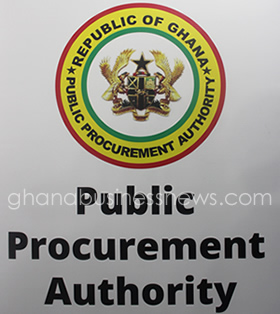Public Procurement Authority launches Unit Cost of Infrastructure Budget Estimate Tool
 In furtherance to the achievement of budget credibility in Ghana’s Public Financial Management System, the Public Procurement Authority (PPA) has developed and launched a Unit Cost of Infrastructure Budget Estimator Tool in Accra on Tuesday.
In furtherance to the achievement of budget credibility in Ghana’s Public Financial Management System, the Public Procurement Authority (PPA) has developed and launched a Unit Cost of Infrastructure Budget Estimator Tool in Accra on Tuesday.
The software application was developed with support from Price Waterhouse Coppers (PwC) under the Public Financial Management Reforms (PFMR) Project 2015-2018.
It is a database tool on the cost of the components of standard infrastructure projects to support a benchmarking system, which would ensure that the estimated total of projects would deliver value for money by reflecting realistic prices.
The project, which began in July 2016, focuses on four broad infrastructure areas namely, roads, buildings, power, water and sewage systems.
Mr Agyenim Boateng Adjei, the Chief Executive Officer, PPA, who formally launched the tool said: “This type of tool would allow the user to vary the elements identified (major cost drivers) in order to analyze how changing these factors affect the cost of delivering the project.
“This would help inform decision making process of how much investment would be required, contingency arrangements and budgeting considerations.
“It would also help control unforeseen cost overruns, allow additional verification of key cost items and support any justifications for project cost items where necessary,” he added.
The Unit Cost of Infrastructure Budget Estimator Tool was launched during a sensitization workshop among various stakeholders such as engineers and procurement officers from Metropolitan, Municipal and District Assemblies, institutions and agencies within the power, water, roads and building sectors of the country.
On activities embarked upon under the project, Mr Adjei mentioned an assessment and evaluation of status quo in Ghana in terms of the determination of Unit Cost of Infrastructure at a stakeholders’ forum and data collection from selected stakeholders for each sector specifically reviewing the cost drivers.
He said in all, over 1,679 contract and tender documents were collected and analyzed across the sectors.
He noted that ‘The Unit Cost of Infrastructure Estimator Tool’ was a novelty in the construction sector in the West Africa sub-region.
He said the practice of public procurement in Ghana was rapidly embracing technological tools to aid efforts at attaining the goals of efficient, effective and transparent public procurement system.
Mr Adjei said: “Like any venture in life, the development of this Unit Cost of Infrastructure Estimator, also had its fair share of frustrations as a result of the limited access to contract data information from the key agencies especially during the general election and transition periods”.
He noted that key experts and their data collection teams also faced various challenges due to the bureaucratic set up of institutions limiting their ability to obtain the requested contract data on-time.
“Thus a mix of these factors caused some delays at the data collection stage but we are grateful to the Almighty God for helping this project see the light of the day,” he said.
Mr Adjei said similar sensitization programmes would be conducted across the country in the coming days.
“I wish to entreat all procurement entities, the donor community, the Budget Division of the Ministry of Finance, Parliamentary Select Committees and other professionals within the construction sector to use this important resource, which will be made available online to arrive at credible budget estimates in the conduct of their duties,” he stated.
Dr Mohammed Sani Abdulai, the Project Director, PFMR, said the Unit Cost of Infrastructure Budget Estimator Tool project was a World Bank project, which was being financed by the PFMR.
He mentioned that the PFMR was also implementing the Ghana Integrated Financial Management Information System (GIFMIS) at the Controller and Accountant General’s Department; the Human Resource Management Information System at the Public Services Commission and the Audit Managing Information System of the Audit Service.
Dr Abdulai further appealed to stakeholders to use these software systems to be able to assist ourselves as a nation.
Source: GNA
